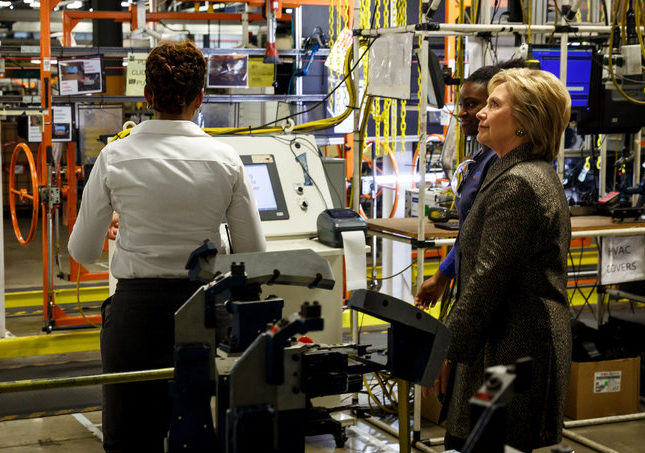I’ve mentioned before that one of the unspoken downsides to the unhinged stylings of walking dunce cap Donald Trump is that we’ve been unable to have a serious, adult conversation about the challenges facing us, economic and otherwise, during this election season.
Case in point: The reshoring of manufacturing in America will not allow us to recapture a giant number of high-paying jobs, not with automation reaching the first stages of maturity. Some corporations and analysts speak excitedly of a collaboration between humans and machines, the two working hand in robotic hand, but that is at best for the near term, with just a few positions for us now and even fewer down the line. If factories are no longer going to provide such solid middle-class positions, what is?
It would be great to ask this question of Hillary Clinton when she speaks about bringing outsourced work home, but it’s tough to focus on such issues since she’s running against a madman.
From Don Lee at the Los Angeles Times:
Here’s a little reality check on the current presidential campaign and promises by both Donald Trump and Hillary Clinton to bring back jobs from overseas.
It’s about a private Michigan company called Ranir, which makes, among other things, the business end of electric toothbrushes. After spending two years and millions of dollars to reengineer its toothbrush heads, Ranir brought back fully one-fifth of that production from China to its facility in Grand Rapids.
It’s precisely the kind of thing that both Clinton and Trump, with varying degrees of emphasis and policy prescriptions, have pledged to accelerate as a way to cure America’s blue-collar woes. Using tougher trade policies with China and others to restore the nation’s manufacturing sector will bring home jobs, the theory goes.
Ranir’s experience appears to back up such assumptions at first blush. After all, now it is American workers who are busy around the clock churning out 13,000 toothbrush heads a day for Wal-Mart, Walgreens and other retailers.
There’s just one catch: Thanks to the new robotic manufacturing process that Ranir adopted, it takes only four workers at the American plant to do the same job that almost certainly required dozens more in China.•
Tags: Don Lee

